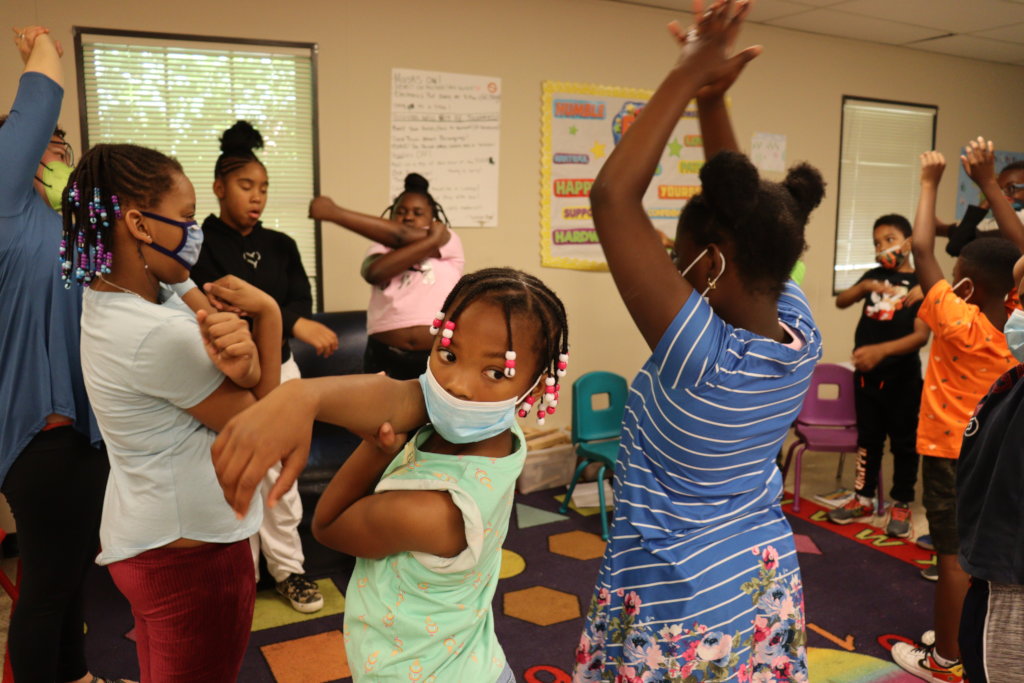By Sarah Brady | Master Teaching Artist
“This artist-in-residency with Story Tapestries and Arianna has truly been the unique difference Waring Station teachers needed to self motivate and improve as teachers. Our teachers are now executing fun and meaningful activities with children in their care. Arianna and Story Tapestries has been a HUGE SUCCESS with our center.”
- Debbie Jones, Kid's Villa Learning Center
This word has been a defining one for the experience most people, including storytellers and teaching artists, have faced since the Covid-19 pandemic began well over a year ago and our world experienced seismic change. Those of us who had been used to performing and presenting in-person with a live audience pivoted to performing and presenting via online platforms. And now, more than a year into the pandemic, the world has begun to shift again, this time taking careful steps closer to the “normal” we once felt we knew.
As with so much in this pandemic season, meeting uncertainty and changing guidelines with flexibility and make-it-work-attitudes has been the touchstone of returning to in-person performances and residencies. And then circumstances changed.
First, temperatures increased, going from the moderate weather we’d been experiencing throughout most of spring to the quite-warm days of almost-summer. Second, the Brood X cicadas that had been waiting dormant in the area for 17 years made their presence relentlessly and vociferously known. The teachers at Mary Hart Center wisely decided that these two factors would be too much to overcome for us to have a successful residency outside. All residency portions would be moved inside, which meant that everyone present would need to wear a mask.
If you had asked me even two years ago about whether it would be possible to tell or teach effectively with a mask covering half of my face, my answer would have come without hesitation: “Of course not! A teller and teaching artist’s face is one of her primary tools!” But, once more, this season proved to be a teacher that would cause stretching and growth in ways that we didn’t think possible.
Once again, we pivoted.
On the day of the kick-off event, mask firmly in place, I told stories to a combined group of preschool to older elementary school children. And there, in the midst of what I once would have called the untenable circumstance of telling stories and teaching from them with a mask covering half of my face and the faces of each teacher and student who was there, something marvelous happened: the stories managed to do their magic. The children participated enthusiastically. There were laughter, intakes of breath, and excellent questions and moments of discussion. And some children whom teachers had expected might not be enthusiastic about a drama and storytelling-based residency showed keen interest.
Through each of the ensuing residency sessions with preschool and school-aged children, I saw interest in and understanding of story grow as students, teachers, and I worked together through activities that supported language arts, social-emotional, and fine motor skill learning in each classroom. But something else happened that I count as one of the most important pieces of any embedded residency: the building of joyful, trust-filled partnership.
Each day of the residency, the basic routine was similar: I would first spend time with the preschool students and then meet with the older students once their school day was complete. And on each day, each group of children greeted the start of our drama time with excitement and communicated what they most enjoyed about the session at the end. After only a couple of sessions, preschool students playing outside when I left the building after the day’s gatherings were complete were stopping their play to call out questions, to introduce me to their parents, or to demonstrate sounds associated with characters from that day’s stories. Similarly, school-aged children began asking whether drama could continue throughout the summer and expressed disappointment when they realized that our drama and storytelling time was coming to an end.
While these relational outcomes can be difficult to quantify, research shows their pertinence to measurable educational benefits. Through this season’s unique circumstances, story was able to exhibit, once again, its strengths as a multi-faceted learning tool that supports key areas of learning in fun, engaging ways while increasing relationship and measurable literacy outcomes, among them increased understanding of story structure and characters; support of building a rich and varied vocabulary; and demonstrated ability to make character and plot-driven choices that can translate from oral to written communications. I’m delighted to have been able to be part of that process.
This story is a reflection about the Discover the Power of the Written Word program, which engaged 1,300+ children and educators in 2021, funded in part by the Children's Opportunity Fund, Maryland State Arts Council, and by support from individual donors - like YOU!
Links:
By Arianna Ross | Executive Director and Master Teaching Artist
By Arianna Ross & the Story Tapestries Team | Executive Director
Project reports on GlobalGiving are posted directly to globalgiving.org by Project Leaders as they are completed, generally every 3-4 months. To protect the integrity of these documents, GlobalGiving does not alter them; therefore you may find some language or formatting issues.
If you donate to this project or have donated to this project, you can receive an email when this project posts a report. You can also subscribe for reports without donating.
Support this important cause by creating a personalized fundraising page.
Start a Fundraiser